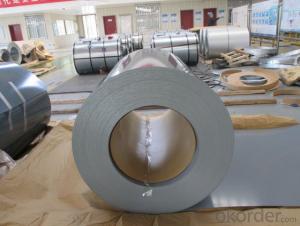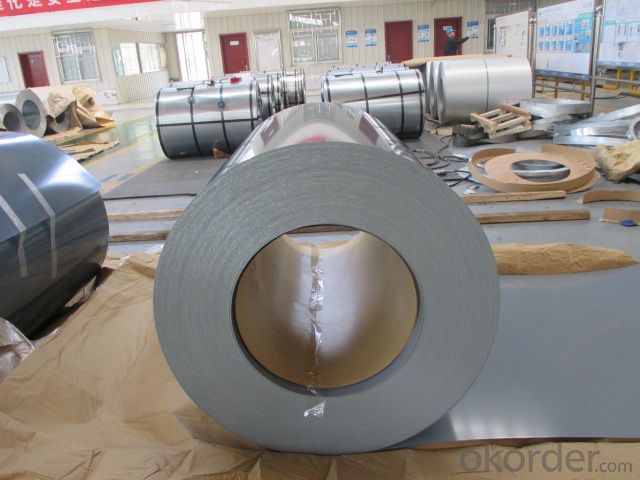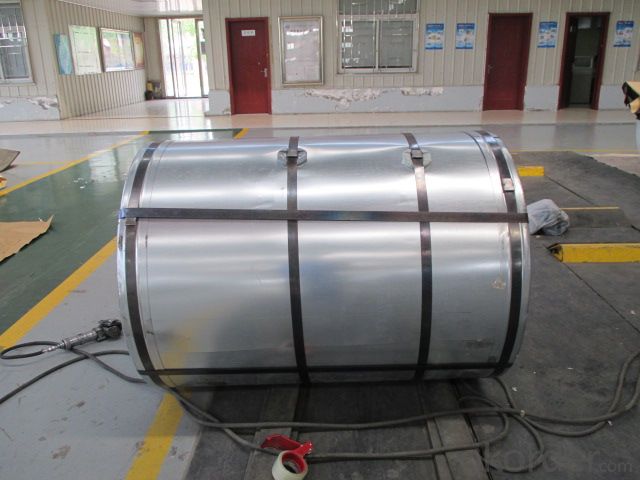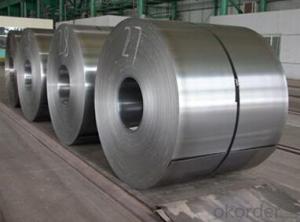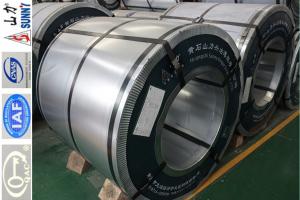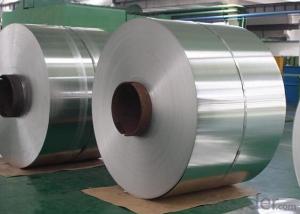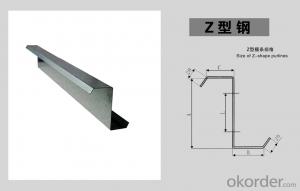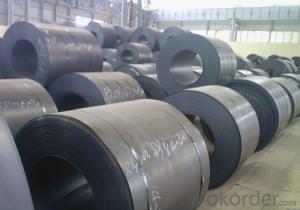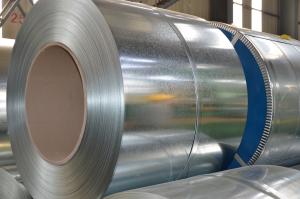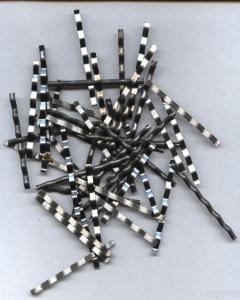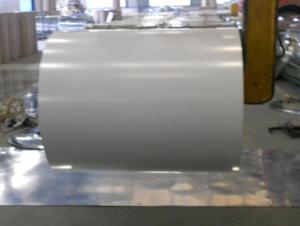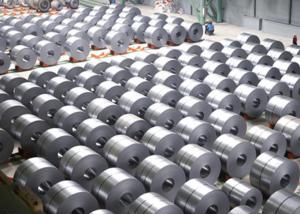galvanized steel G550
OKorder Service Pledge
OKorder Financial Service
You Might Also Like
Galvanized steel coil
Packaging & Delivery
Packaging Detail: seaworthy export package
Delivery Detail: on request
Specifications
1. more than 10 years’ experience on this field
2. advanced equipments
3. competitive price
4. soonest delivery
Product Description :
Commodity | Hot dip galvanized steel coil |
Technical Standard: | JIS 3302 / ASTM A653 / EN10143/ GB/T 2518 |
Grade | DX51D/ S250,280,320GD,SGCC,SGHC,SGH340,SGH400,SGH440,G450,G550 |
Types: | Commercial / Drawing / Deep Drawing / Structural quality |
Width | 900mm/1000mm/1219mm/1200mm/1220mm/1250mm |
Thickness | 0.2mm~4.0mm |
Type of coating: | galvanized |
Zinc coating | Z40-275g/m2,Z40-Z450g/m2 |
Surface treatment | chromed / skinpass/ oiled/slightly oiled/ dry/ |
Surface structure: | zero spangle / regular spangle/ big spangle |
ID coil | 508mm or 610mm |
Coil weight | 3-10/MT per coil |
Package: | Properly packed for ocean freight exportation in 20''containers |
Application: | home appliances, constructions, building, machineries |
Price terms | FOB,CFR,CIF |
Payment terms | T/T,L/C |
delivery time | 25~40days after deposit or the receipt the L/C |
Remarks | Insurance is all risks |
MTC will be handed on with shipping documents | |
We accept the third party certification test |
Our Advantages :
1. Expertise:
More than 10 years of manufacture: we know how to properly handle every step of production.
2. Competitive price:
We can offer competitive prices to our customers.
3. Accuracy:
We have excellent technicians and leaders, which can ensure our products are exactly what you want.
4. Materials:
All galvanized steel coils are made of high-quality raw materials.
5. Certificate:
Our products are certified by ISO9001.
6. Productivity:
We have large-scales of production lines,, which can guarantee all your orders will be finished in earliest time.
Our Production Line
Hr CGL Technical Process:
Coil loading-> uncoiling-> cutting-> welding-> entry accumulator-> Heating and deoxidization-> galvanizing-> air cooling->water quenching-> air dryer-> tension leveler-> Passivation->air dryer->exit accumulator-> oiling-> cutting-> recoiling->coil unloading-> packing
The furnace heating style: improved Sendzimir heating technology
Hourly output: max.76.3t/h
Process after coating: tension leveling, Passivation or oiling
Our Service
Our quality
Test Equipments of Prepainted Galvanized Steel Coil : Salt-spray tester; Atomic absorption spectrophotometer; Rockwell typer hardness tester; Tensile test machine; Metrohm titration; Laboratory Bend test machine.
Our packing
Properly packed for ocean freight exportation in 20''container, galvanized metal fluted rings on inner and outer edges, galvanized metal & waterproof paper wall protection disk, galvanized metal & waterproof paper around circumference.
R&D department
R&D department concentrates on researching and developing reliable products with best quality. The quality department test and control every process of production to guarantee the best quality of products
Our Application
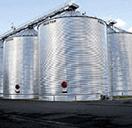
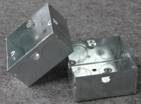
- Q: How are steel products used in the manufacturing of appliances and consumer goods?
- Steel products are widely used in the manufacturing of appliances and consumer goods due to their durability, strength, and versatility. Steel is commonly used to make the frames, casings, and components of appliances like refrigerators, ovens, washing machines, and dishwashers. It provides the necessary stability and structural integrity to support and protect the internal components. Additionally, steel is used in consumer goods such as kitchenware, cutlery, and tools due to its resistance to corrosion and its ability to maintain a sharp edge. Overall, steel plays a crucial role in ensuring the quality and longevity of appliances and consumer goods.
- Q: How are steel profiles used in the fabrication of conveyor systems?
- Steel profiles are commonly used in the fabrication of conveyor systems as they provide strength, durability, and versatility. These profiles are used to construct the framework, support structure, and various components of the conveyor system, such as the conveyor belt, rollers, and guides. The steel profiles are carefully designed and fabricated to ensure the conveyor system can handle the required load capacity and operate smoothly. Additionally, steel profiles can be easily customized and assembled to meet specific conveyor system requirements, making them an ideal choice for efficient and reliable material handling.
- Q: How is steel used in the production of consumer goods?
- Steel is commonly used in the production of consumer goods due to its strength, durability, and versatility. It is used in various forms, such as sheets, rods, or wires, to create a wide range of products, including appliances, furniture, tools, and automotive parts. Steel's ability to withstand heavy loads and resist corrosion makes it an ideal material for consumer goods that require strength and longevity.
- Q: How is steel used in the construction of railway stations?
- Steel is used in the construction of railway stations for various purposes, including the structural framework, platforms, staircases, and roofing. It provides strength, durability, and flexibility, allowing for the construction of large, open spaces and facilitating the movement of people and trains within the station. Additionally, steel is used for the fabrication of tracks, signaling systems, and other infrastructure components, ensuring the safe and efficient operation of the railway station.
- Q: How does the quality of steel affect its performance?
- The quality of steel directly impacts its performance. Higher quality steel, which is typically made with strict manufacturing standards, results in stronger, more durable, and more reliable performance. This can enhance its ability to withstand stress, resist corrosion, and maintain its structural integrity over time. Conversely, lower quality steel may be prone to defects, brittleness, and reduced performance, making it less suitable for demanding applications.
- Q: What are the different types of steel fittings and their uses?
- There are several types of steel fittings commonly used in various industries. Some of the most common types include steel elbows, steel tees, steel reducers, steel couplings, and steel flanges. Steel elbows are used to change the direction of a pipeline, allowing for smooth flow in the desired direction. Steel tees are used to branch off a pipeline into two or more directions. Steel reducers are used to connect pipes of different sizes, allowing for a smooth transition. Steel couplings are used to connect two pipes together, providing a secure and leak-proof joint. Steel flanges are used to connect pipes or valves to other equipment, such as pumps or tanks, and provide an easy access point for maintenance or repair. Overall, steel fittings are essential components in piping systems, ensuring proper flow, connection, and functionality in various applications across industries like oil and gas, construction, and manufacturing.
- Q: How do steel products contribute to the defense and security sector?
- Steel products contribute to the defense and security sector in several ways. Firstly, steel is widely used in the manufacturing of military vehicles and equipment, providing strength and durability necessary for combat operations. Additionally, steel is utilized in the construction of military infrastructure and facilities, such as bases and fortifications, ensuring their resilience and protection. Furthermore, steel is crucial in the production of munitions and firearms, delivering essential components for defense forces. Overall, steel products play a vital role in strengthening the defense and security sector by providing the necessary materials for robust and reliable military operations.
- Q: What are the different types of steel angles and channels available?
- There are several types of steel angles and channels available, including equal angle, unequal angle, L-shaped angle, C-shaped channel, and U-shaped channel.
- Q: What are the different types of steel profiles and sections available?
- There are various types of steel profiles and sections available, including I-beams, H-beams, U-channels, C-channels, angles, and T-sections. Each type has its own unique shape and dimensions, making them suitable for different structural and construction applications.
- Q: How do steel products contribute to sustainability and environmental protection?
- Steel products contribute to sustainability and environmental protection in several ways. Firstly, steel is a highly durable material, allowing products made from it to have a longer lifespan and reducing the need for frequent replacements. This helps conserve resources and reduce waste. Additionally, steel is 100% recyclable, meaning it can be reused indefinitely without losing its properties. Recycling steel reduces the demand for raw materials and lowers energy consumption and greenhouse gas emissions associated with its production. Furthermore, steel is used extensively in renewable energy infrastructure, such as wind turbines and solar panels, contributing to a cleaner and more sustainable energy mix. Overall, steel products play a crucial role in promoting a circular economy and minimizing the environmental impact of various industries.
Send your message to us
galvanized steel G550
OKorder Service Pledge
OKorder Financial Service
Similar products
Hot products
Hot Searches
Related keywords
